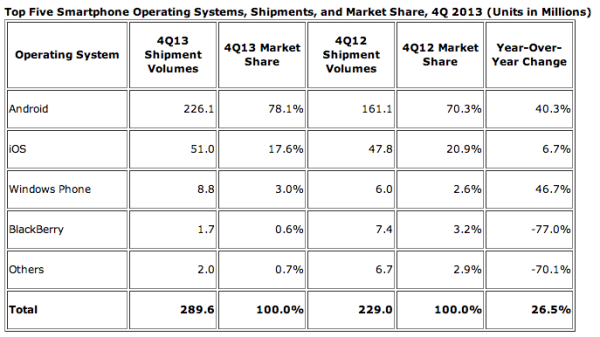As Microsoft Figures Out Next Mobile Move, Apple & Android Grab 94 Percent Of Smartphone Market
- Fahad H

- Feb 13, 2014
- 2 min read
According to hardware tracking firm
IDC, “Android and iOS accounted for 95.7 percent of all smartphone shipments in the fourth quarter of 2013, and for 93.8 percent of all smartphone shipments for the year.” Yet Windows Phone wasn’t entirely shut out.
On a percentage basis, Windows Phones grew more than other platforms. But in real handset terms, Windows Phone is still very much a bit player, except in a few markets where its share has approached or reached 10 percent.

Source: IDC
As new Microsoft CEO Satya Nadella takes the helm in Redmond, he must contemplate how to accelerate Microsoft’s mobile growth. One such way might be to allow Windows Phones to run Android apps.
According to a report in The Verge yesterday there’s an internal debate going on at Microsoft about whether to permit Android apps to run on Windows Phones:
Sources familiar with Microsoft’s plans tell The Verge that the company is seriously considering allowing Android apps to run on both Windows and Windows Phone. While planning is ongoing and it’s still early, we’re told that some inside Microsoft favor the idea of simply enabling Android apps inside its Windows and Windows Phone Stores, while others believe it could lead to the death of the Windows platform altogether. The mixed (and strong) feelings internally highlight that Microsoft will need to be careful with any radical move.
It’s far from clear what will happen. But Nokia, which developed a low-cost Android handset last year, is apparently still going to release it into the market despite the Microsoft acquisition. That’s according to a report in the Wall Street Journal.
The phone is apparently mildly “forked” and won’t feature the full complement of Google services:
The Nokia phones will differ from most other Android smartphones, and won’t access some Google-developed features or Android apps from the Google Play storefront, said the people familiar with the matter.Instead, the phone will come installed with digital services created by Nokia and Microsoft, including mapping service Here and streaming music service MixRadio, as well as a Nokia application store.
The Nokia-Android phone was under development before the Microsoft acquisition was announced. One of the reasons that Microsoft bid for Nokia’s hardware division was to prevent the Finnish company from developing Android handsets and turning away from Windows Phones.
Indeed, had Nokia embraced Android from the beginning, it probably wouldn’t have had to sell its handset division.




Comments